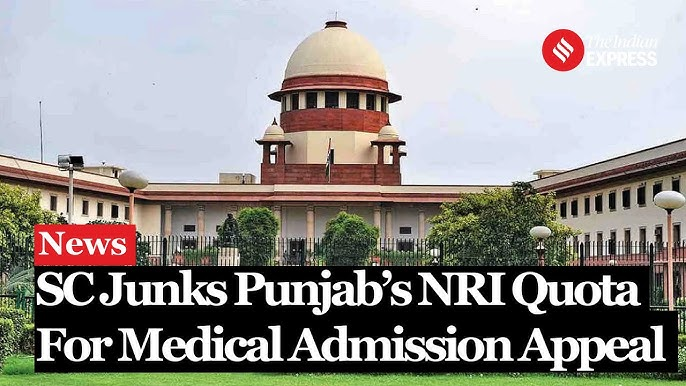SC Condemns Punjab’s Expanded NRI Quota
Why in the news?
- The Supreme Court condemned Punjab’s move to expand the NRI quota in medical colleges, calling it a “fraud” on the education system.
- A bench led by CJI D.Y. Chandrachud dismissed petitions challenging a Punjab and Haryana High Court order that had quashed the expanded quota.
- The bench stressed that the NRI quota should not be used to bypass merit-based admissions.
Flawed Expansion of NRI Quota:
- Punjab’s notification expanded the NRI quota to include distant relatives like uncles, aunts, and cousins.
- The Court ruled that such a broad interpretation of NRI eligibility is a “money-spinning tactic” that compromises educational integrity.
- The Punjab and Haryana High Court had earlier termed the move unjustified and contrary to the NRI quota’s original purpose.
Merit-Based Admissions Compromised:
- The Court rejected arguments that other states, like Himachal Pradesh and Uttar Pradesh, use similar NRI quota expansions.
- The bench emphasised that the NRI quota should be reserved for genuine NRIs and that merit should not be sacrificed for financial gain.
- The ruling referenced the 2005 PA Inamdar judgement, which disallowed the use of money power to bypass merit-based admissions.
About the Non-Resident Indian (NRI):
- Definition: An individual living outside India for more than 182 days in the previous financial year.
- Eligibility: Indian passport holder residing abroad for employment, education, or business.
- Key Benefits:
- Special education reservation quotas.
- Overseas bank accounts like NRE, NRO, RFC.
- Tax-free income earned abroad.
- Voting rights in India (with physical presence).
- Limitations:
- Cannot purchase agricultural land.
- Ineligible for Aadhaar cards without staying in India for 182 days.
Difference from OCI/PIO:
OCI provides lifelong visas and PIO has been merged into OCI since 2015.
Sources Referred:
PIB, The Hindu, Indian Express, Hindustan Times




